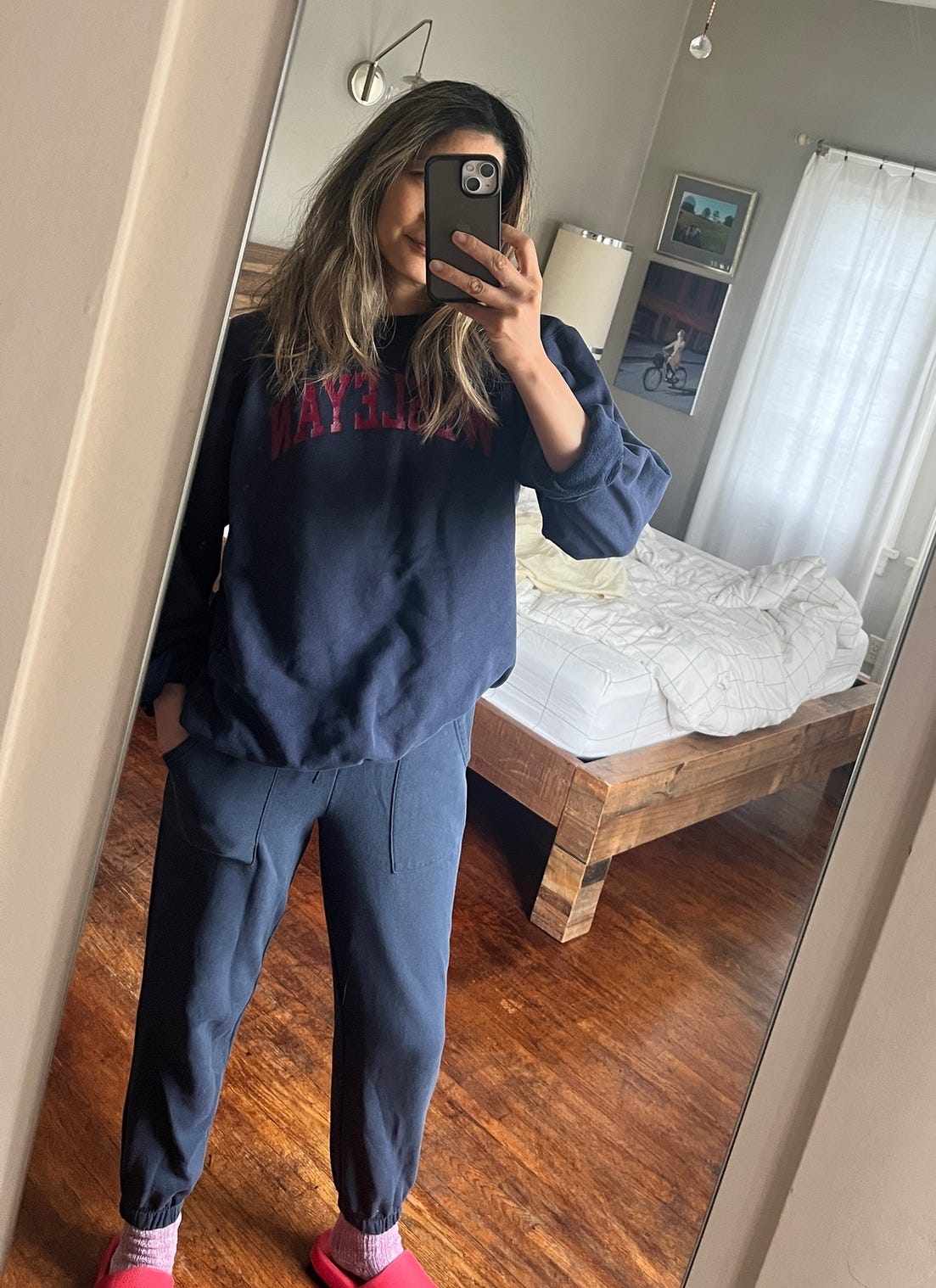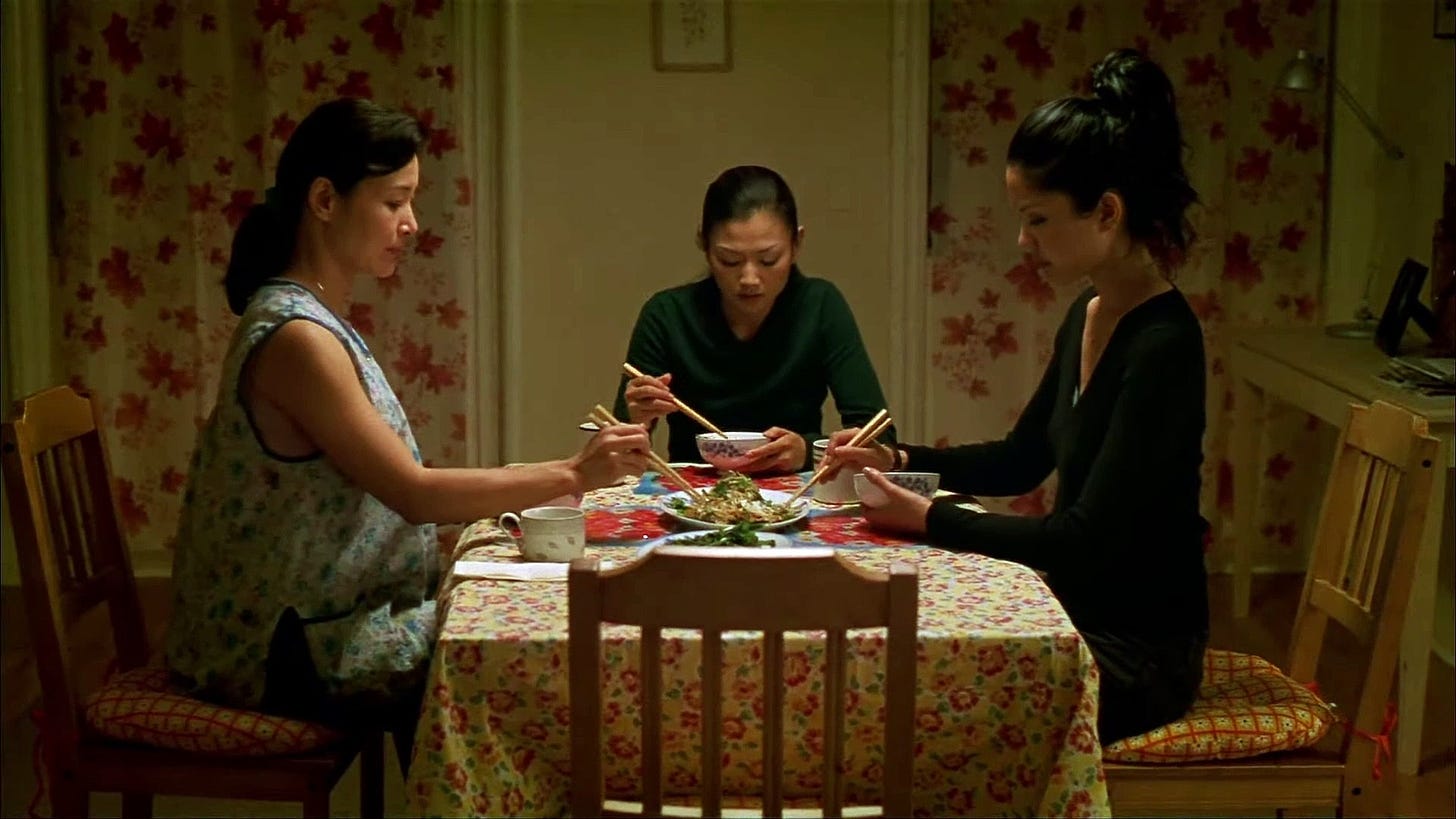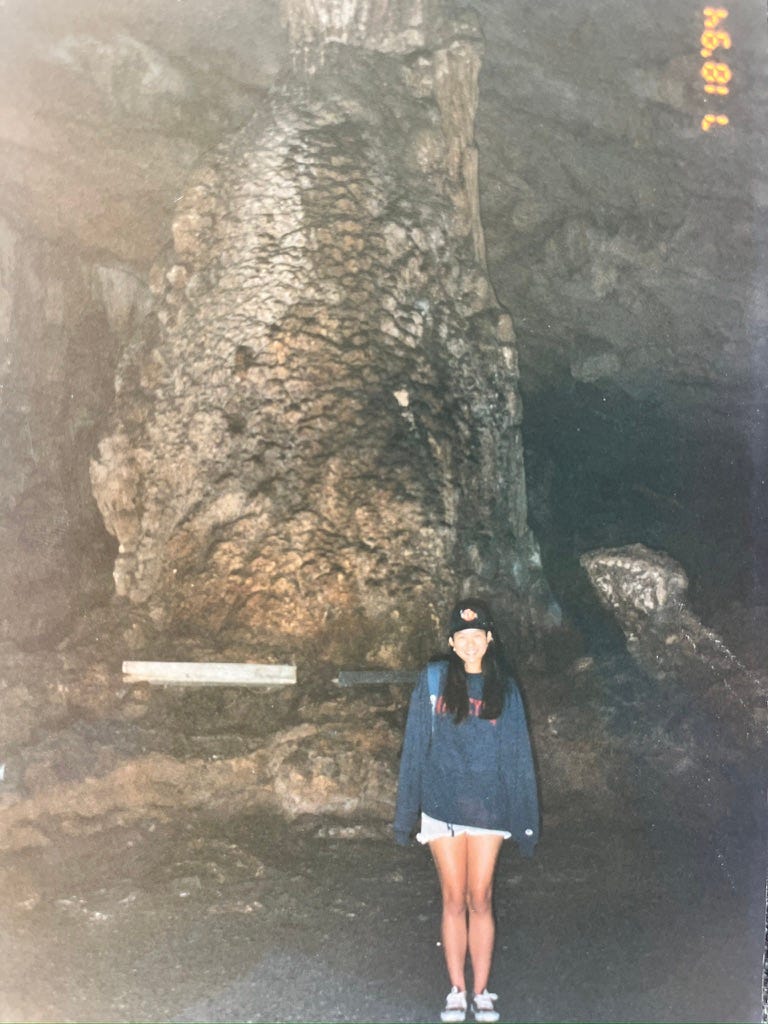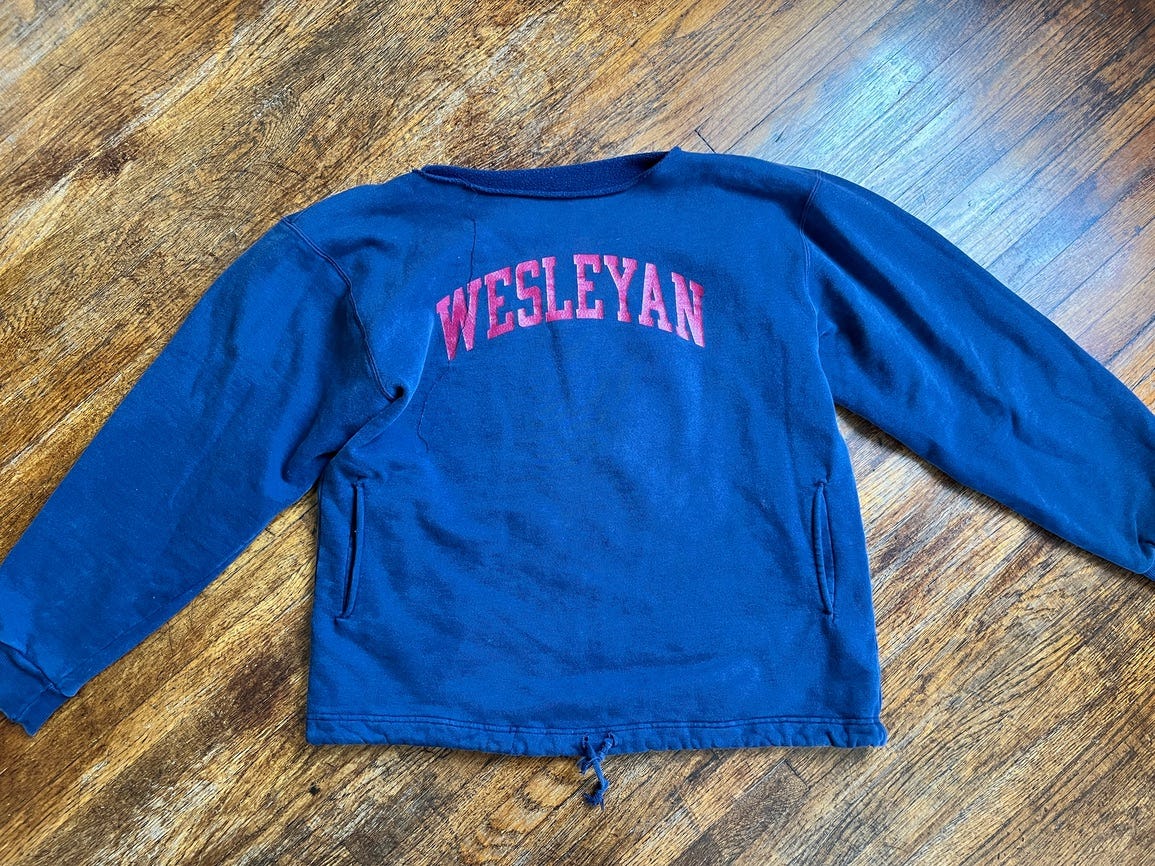112/ Silent Witnesses ft. Lynn Chen
The actress, writer, director on three iterations of her alma mater hoodie as a symbol of hope.
Silent Witnesses is a series featuring extraordinary women, and the clothes which have borne silent witness to different events and seasons of their lives. Read the last instalment with Jacqui Young-Sterling here.
For this edition of Silent Witnesses, I had the pleasure of sitting down with actress Lynn Chen over Zoom! Me at my breakfast table in Toronto, and Lynn at home in Los Angeles wearing the worn-in, cut-up, and hand-sewn Wesleyan hoodie that would be the subject of our call.
Eventually, anyway, because we had a lot to talk about before we got into it!
Lynn has been acting since she was five, although for the better part of the last two decades, she has also produced an extensive body of creative work as a writer, director, musician, podcaster, host, and most recently, Substacker.
She’s the author of Gen X Taste, a humorous lifestyle newsletter “at the intersection of nostalgia and novelty,” and YELLOW PAGES, a monthly newsletter recommending AAPI1 films, music, writing and other inspiration with guests contributors that have included Randall Park and Constance Wu.
After our call, I took some time to go through Lynn’s creative oeuvre, including watching her in her most critically-acclaimed role as Vivian Shing, a New York-based dancer in the 2005 rom-com, Saving Face. In the film, Vivian’s budding romance with her co-star, a rising young surgeon named Wilhelmina Pang (Michelle Krusiec), bumps up against traditional Chinese cultural expectations and the familiar East Asian concept of “face” in a script that is funny, full of surprises, and ultimately, heartwarming. If you haven’t seen it, you really should!
As a Korean-Canadian of about the same vintage, it didn’t escape me that for the majority of Lynn’s 40-year acting career, she probably didn’t have “the look” for most roles, and when she did, she could expect for that role to — to some extent — fulfill a stereotype. Which is why, Saving Face, which premiered at TIFF and Sundance, was such an important film and, 20 years later, is still being discovered by wider audiences and discussed in comparative gender courses.
Since graduating from college in 1998, Lynn has consistently found work as an actress, carving out a niche for herself in indie roles. “I was like Parker Posey or Greta Gerwig, but as I’ve gotten older, someone else has taken those reins,” she muses. Also, any Grey’s Anatomy fans out there? You may recognize her from her role as Dr. Michelle Lin, head of plastic surgery during Season 18!
Lynn grew up in Bergen County, New Jersey, then went to Wesleyan for college in Middletown, Connecticut where she met her husband, producer/director Abe Forman-Greenwald. After a seven year stint in Astoria, Queens, the couple moved to Los Angeles in 2005 and have been living there ever since.
“This item of clothing is my longest companion,” says Lynn, looking down at her sweatshirt. “My father went to Wesleyan — he was an ethnomusicology Ph.D student — and my brother was born in Middletown. So, I had always hoped that I’d go to this school.”
The sweatshirt is currently in its puff sleeve iteration, although it had lived as a boatneck for decades. That is, after Lynn cut off the hood it had originally come with when she purchased it from the Wesleyan bookstore on a pre-frosh campus tour.
“I wanted a sweatshirt, and my father talked me into this one because it was really practical. The funny thing is that these aren’t even Wesleyan’s colours. They’re known as the Cardinals, so their red is not this kind of red, but a very bright cardinal red. Since then, most of their things have been against grey, black, or white and I wanted a cool grey crewneck like everyone else.”
“But my father was like, ‘This is unique! This quality is very good [note: it was OG Champion]! And, I’m paying for it, so you have no choice.’” We both agreed that this was a very Asian parent line of reasoning.
Lynn applied early decision and soon found out she was waitlisted — “I was devastated” — but happily, towards the end of her school year, she found out she was accepted right before a family trip to China. “The photo was me in China in an underground cave. Even though it was summer, I had the sweatshirt with me at all times because I was very proud that I was going to be going to Wesleyan.”
Soon after her China trip, Lynn was still so very proud, but also so very self-conscious. Not many women were rocking hoodies in Cresskill, New Jersey in ‘93 or ‘94. So, she reasoned, why not cut it off? After all, she had done it to plenty of t-shirts already.
“I didn’t do it to be punk rock — I wasn’t cropping them or doing the sleeves — I think I was trying to give myself a scoop situation. A too-high neckline felt too formal for me.”
“As I took the scissors to the sweatshirt, I had a feeling in my stomach that this could be a horrible mistake because I only got one shot and Dad wouldn’t buy me another one! I remember going for it and about halfway through thinking, ‘Mistake!!!’”
But it was too late. “I remember how low I had to cut to get rid of that hood, but I just kept going! It was comical how large the opening was.”
Now instead of a hoodie, Lynn had her own massively off-the-shoulder sweatshirt at a time when the zeitgeist had moved on from the influence of Flashdance.
“I wish I hadn’t cut it off. I felt like it wasn’t okay. I was very self-conscious when I wore it, but I wore it all the time anyway, usually with a tank or tee underneath.”
And she continued wearing it for the next 25 years.
I ask Lynn what the sweater represents to her. “A big theme in my life is rejection,” she begins.
I do a double-take, because I wasn’t expecting that. During our chat, Lynn is chatty, easy to laugh and exudes positive energy. Prior to that moment, I’ve only known Lynn through what I’ve read about her accomplishments on IMBD, Instagram, and Substack.
“As an actress, there’s so much rejection in that world. For many years I struggled with infertility, which is also a form of rejection.”
Lynn has been quite public about her infertility, “to the point where it became part of my identity to embrace my child-free decision. I’d done an interview for the Huffington Post, a viral video for BuzzFeed, shared my full journey in podcasts and blog posts. I even wrote an entire TV pilot about it that I’ve been trying to sell!”
Through her earlier blog/podcast, The Actor’s Diet, she spoke about her experiences with overcoming her lifelong eating disorder. She co-founded the first body image site for Asian-American women, Thick Dumpling Skin with Lisa Lee and has been an Ambassador for the National Eating Disorders Association (2012-2019).
Because of her successes and perseverance, it’s easy to gloss over the fact that, in some form or another, all of us struggle with experiences that are universal — like, rejection.
“When I was waitlisted at Wesleyan, even though it wasn’t a rejection, it felt like I was about to become someone who was about to live a life of rejection. I was still young enough that I had so much hope for my future, and I remember thinking, ‘Uh oh, I don’t like this feeling of having worked so hard and knowing exactly what I want and [Wesleyan] still saying, we don’t know if we want you.”
I mean, I sure can relate to that.
“I think when you live with rejection as your baseline for 90% of how you move through this world, you start to have this narrative that, ‘No matter how hard I try, I’m not going to get what I want. What’s the point of this?’”
“So to me, this sweatshirt symbolized at the time — and still does — that I can actually get what I want. It’s a reminder to chill out, that you don’t need to be constantly thinking you’re not going to get what you want because [this sweatshirt] is proof that you did something huge that you wanted. And, it led to you meeting your husband, who you’re still married to, and also many of your friends. I learned so much, I loved going to that school.”
As for the sweatshirt, it went through yet another iteration in 2023 when Lynn took her needle and thread and sewed up part of the neckline. “I didn’t want it to be constantly to be falling off my shoulders! I guess I could have brought it to a tailor to do it properly,” she laughs.
The result is a sort-of puff-sleeve effect, but Lynn’s rolling with it. “There’s something about all of this that makes me feel like I’m young.” And as a testament to the quality of clothing in the ‘90s, the sweatshirt has held up really well.
“Despite the fact that I’ve cut it up and washed it a million times, it doesn’t have any holes, it hasn’t faded, and it’s still the colour I remember it being. It’s a really nice weight and feels rugged; I definitely feel strong and comforted when I wear this. Like, I don’t give a shit. I haven’t given a shit since the ‘90s! There’s this attitude I had when I wore it, like, ‘Yeah that’s my shoulder!’ I feel like I’ve owned that to this point, and now here I am with this puff sleeve! And I still feel that way. Like if I was at a coffee shop and someone was starting at my shoulder, I would still have the same attitude.”
Asian American and Pacific Islander. I’m fascinated by the acronyms different countries have for Asians, and also how minority groups are grouped and why. Take the UK’s BAME, for example: Black, Asian and minority ethnic.
Next Post: 113/ What I'm Wearing: Weeks 29 & 30









This is really affecting. Thank you.